|
|
|
Sort Order |
|
|
|
Items / Page
|
|
|
|
|
|
|
| Srl | Item |
| 1 |
ID:
183577
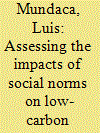

|
|
|
|
|
| Summary/Abstract |
Policymakers and scientists are paying increasing attention to how social norms can promote pro-environmental behaviour and sustainable energy use. We contribute to this field by experimenting with and assessing the impacts of social norms on low-carbon mobility options. Taking Sweden as a case study, we develop two complementary randomised controlled experiments to: 1) analyse the role of social norms in promoting the adoption of car sharing services (CSS) via descriptive and injunctive norms (N = 720); and 2) investigate potential crowd out effects when injunctive norms are used to promote a low-carbon transport hierarchy (N = 730). First-order effects show that social norms have a positive but marginal impact on the willingness to adopt CSS, and only injunctive norms have the potential to steer behaviour in the desired direction. Results also suggest that concerns about potential substitution effects between low-carbon transport options and CSS are not valid. With due limitations, our findings have various implications for policymaking, notably that for social norms to be effective, other policy instruments are critically needed. Of particular importance are the environmental effectiveness of CSS and complementarities between public transport and active mobility (i.e. walking and cycling).
|
|
|
|
|
|
|
|
|
|
|
|
|
|
|
|
| 2 |
ID:
169733
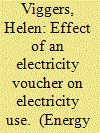

|
|
|
|
|
| Summary/Abstract |
The aim of this paper is to examine the effect of receiving a voucher for electricity on the electricity use of a household. The Warm Homes for Elder New Zealanders Study was a randomised controlled trial which gave participants aged over 55 with chronic obstructive pulmonary disease a voucher providing NZ$500 credit to their electricity account for one winter. Electricity use increased over the winter the participant received the voucher. Participants with lower initial electricity use increased their consumption by about 10%, those with medium- or high-initial use by 2–3%. However, most participants did not use the entire value of the voucher on additional electricity. The study involved only a small informational component: this consisted of a brochure sent to the participants to encourage them to increase their energy use. This was designed to mimic the effects of a possible widespread rollout of this programme. The policy implication of this analysis is that a winter energy voucher accompanied by minimal education was effective at increasing winter energy use among a vulnerable sub-population with a health condition that merited additional heating in winter.
|
|
|
|
|
|
|
|
|
|
|
|
|
|
|
|
| 3 |
ID:
177487
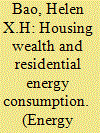

|
|
|
|
|
| Summary/Abstract |
The housing wealth effect often manifests as a positive relationship between consumption and perceived housing wealth (e.g. the perceived value of houses). When the perceived value of a property rises, homeowners may feel more comfortable and secure about their wealth, causing them to spend more. This study adopts a behavioural approach to verify if this relationship holds true for residential energy consumption in the UK. While controlling for property characteristics and a large number of demographic, socioeconomic and energy-use behaviour variables, we identified a significant relationship between housing wealth and energy consumption. Our models also considered psychological biases in energy consumption behaviours, such as the framing effect. Our findings shed light on the behavioural aspects of housing wealth effect on residential energy consumption and demonstrate the potential to ‘nudge’ households towards energy conservation. Most importantly, we provide empirical evidence on the intriguing relationship among housing wealth, residential energy consumption and fuel poverty. The findings of this study are particularly helpful in designing and implementing energy consumption policies that can strike a balance between social justice and economic efficiency.
|
|
|
|
|
|
|
|
|
|
|
|
|
|
|
|
| 4 |
ID:
116710
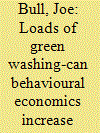

|
|
|
|
|
| Publication |
2012.
|
| Summary/Abstract |
The EU energy efficiency labelling scheme has successfully increased demand for efficient appliances by providing a prominent letter rating to consumers during their product search. Behavioural economics (BE) suggests the adoption of efficient appliances could be accelerated further by: (i) monetising efficiency, (ii) directly communicating the link between efficiency and carbon emissions, (iii) communicating the long-term (e.g., operational life) financial and environmental impact of product choices, and, (iv) framing the information as avoided losses ('extra') rather than gains ('savings'). This study tested these hypotheses via an online, stated preference survey of 465 UK residents using actual market pricing and efficiency data for washing machines. The provision of information about either running costs or running emissions did encourage selection of more expensive and efficient products (strongly correlated variables in the choice set and actual market) (p<.001, r=.30-.41) with no statistically significant difference between their impact. Providing lifetime running cost information also nudged respondents towards more expensive, efficient products than annual information (p=.006-.027, r=.15-.18). Finally, loss-framed running emissions information encouraged selection of more expensive, efficient products than gain-framed information (p<.05, r=.13-.16). The EU label is an impracticable means of communication, but digital communication channels (e.g., price comparison websites) may offer potential for inexpensive localisation and personalisation of the information. The results suggest that successful communication could benefit the private sector whilst making a contribution to reducing carbon emissions.
|
|
|
|
|
|
|
|
|
|
|
|
|
|
|
|
| 5 |
ID:
127905
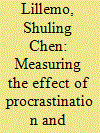

|
|
|
|
|
| Publication |
2014.
|
| Summary/Abstract |
A common finding in behavioural economics is that people often procrastinate, i.e., keep postponing planned tasks or decisions that require effort to execute. The effect of procrastination on inter-temporal energy choice behaviours could be even more serious because energy is an abstract, invisible and intangible commodity. This paper uses a web survey to investigate how people's procrastination propensity and environmental awareness affect their heating-energy-saving behaviours. The results indicate that people who state that they have a higher tendency to procrastinate are significantly less likely to have engaged in most of the heating energy-saving activities, especially regarding larger purchases or investments in equipment and the insulation of doors and windows. I also found a positive relationship between environmental awareness and engaging in everyday energy-saving activities such as reducing the indoor temperature. The findings suggest that measures aimed at reducing procrastination are needed to realise energy-saving potential. It is important to find ways to either bring future benefits closer to the present or to magnify the costs of delayed action. For example, one can employ certain feedback systems and commitment devices to make current gains and future costs more visible or tangible.
|
|
|
|
|
|
|
|
|
|
|
|
|
|
|
|
| 6 |
ID:
092398


|
|
|
|
|
| Publication |
2009.
|
| Summary/Abstract |
This paper reviews two contrasting approaches governments use to engage the citizen to promote better public policy outcomes: nudging citizens using the insights of behavioural economics, as summarised by Thaler and Sunstein (2009) or giving citizens the space to think through and debate solutions, as indicated by proponents of deliberative democracy. The paper summarises each approach, giving examples; then it compares and contrast them, illustrating their relative strengths and weaknesses. The paper concludes by suggesting that the approaches share some common features and policy-makers could useful draw upon both.
|
|
|
|
|
|
|
|
|
|
|
|
|
|
|
|
| 7 |
ID:
176729
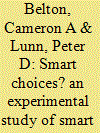

|
|
|
|
|
| Summary/Abstract |
The introduction of smart technology and dynamic tariffs (such as time-of-use tariffs) provides multiple potential benefits for electricity markets. However, time-of-use tariffs generate additional complexity for consumer tariff choices in electricity markets. How well consumers can choose between tariffs, and whether certain tools improve these choices, are therefore important questions for energy regulators and policy makers. This paper presents an exploratory study that used experimental behavioural science to investigate consumer choice in electricity markets with time-of-use tariffs. A representative sample of consumers (n = 145) were given information about smart meters and time-of-use tariffs. A sequence of experimental tasks measured attitudes towards smart meters, comprehension of tariffs and quality of decisions between different types of electricity tariffs, where quality was judged against participants’ own perceptions of their electricity usage. The findings suggest that consumers struggle to match tariffs to usage accurately, with a general aversion to time-of-use tariffs that may lead to sub-optimal choices between tariff types. When participants chose between different priced time-of-use tariffs via an experimental price comparison site, decisions were significantly improved by a tool that personalised estimated costs. Policy implications include the importance of pre-testing interventions designed to improve consumer decisions.
|
|
|
|
|
|
|
|
|
|
|
|
|
|
|
|
| 8 |
ID:
182556


|
|
|
|
|
| Summary/Abstract |
The use and exploration of outer space is, according to the Outer Space Treaty (OST), to be carried out for the benefit and interest of all parties. Outer space is critically important to the defence and national security interests of many nations, none more so than the United States. Over time, a significant space junk problem has emerged. There is growing recognition of this problem and reason to believe that it will only get worse if current activities continue. Space junk presents a threat to the national security interests and economic interests of spacefaring nations. Various solutions are being proposed and developed. This paper presents an economic perspective and, in a particular, a behavioural economics perspective, on the space junk and national security problem. As various potential technological solutions emerge, we are interested in the obstacles that may stand in the way of an optimal prioritisation of the alternatives.
|
|
|
|
|
|
|
|
|
|
|
|
|
|
|
|
| 9 |
ID:
177136
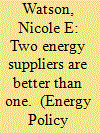

|
|
|
|
|
| Summary/Abstract |
Usually consumers have a single energy supplier. Permitting consumers to take on additional contracts with local suppliers in a multiple-supplier model could support growth of local renewable energy. The aims of this study were to assess the attractiveness of a multiple-supplier model and to understand whether consumers would be more likely to engage with local energy suppliers in a multiple-supplier model or the current single supplier model. An additional aim was to explore the role of default effects and cognitive biases associated with remaining with incumbent suppliers (loss-aversion, cognitive effort and implied endorsement). Two nationally representative survey experiments were conducted in Great Britain (n = 1042, n = 762). Results showed that participants were significantly more likely to engage with local energy suppliers under a multiple-supplier model than the current single supplier model. In one experiment, consumers’ preference for adding a local supplier under a multiple-supplier model was so strong that it overcame default effects. The perception that the supplier has been recommended (i.e. implied endorsement) was the most robust mechanism associated with remaining with default suppliers, suggesting that explicit endorsement of local energy suppliers may encourage uptake. Results suggest multiple-supplier models are likely to be a promising avenue for increased energy market engagement.
|
|
|
|
|
|
|
|
|
|
|
|
|
|
|
|
|
|
|
|
|